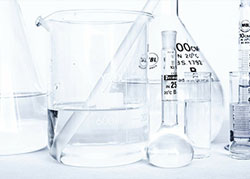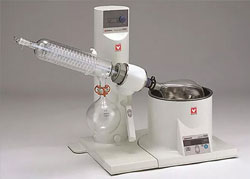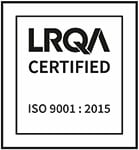Ethanol for Manufacturing
Ethanol is a multifaceted solvent that mixes without separation in water and other organic solvents including acetic acid, acetone, benzene, carbon tetrachloride, chloroform, diethyl ether, ethylene glycol, glycerol, nitromethane, pyridine, and toluene.
Sterile Denatured Ethanol
Denatured ethanol (or ethyl alcohol) diluted to a seventy-volume percent (70%) solution is largely used throughout life science cleanrooms to sanitize work surfaces, gloves, and tools.
Denatured Ethanol (190 Proof)
We have bulk shipments ready to be loaded of FCC grade ethanol; specially denatured spirits (SDS 40b) which is the preferred method by the FDA for producing hand sanitizer.
Absolute Ethanol (200 Proof)
Pure, or absolute ethanol achieves ethanol concentration higher than 99%+ with advanced processing techniques.
Ethanol Applications
Ethanol for Surface Sanitation
Ethanol is widely regarded as an effective degreaser, sanitizer, and solvent for non-porous surfaces. Denatured ethanol is only used for cleaning and sanitation purposes, or general manufacturing applications. Sterile denatured ethanol is ideal for sensitive applications such as laboratories, pharmaceuticals, and general cleaning of sensitive equipment including laminar flow hoods and biological isolator cabinets.
Ethanol is known for being effective against a wide variety of bacteria, viruses, and pathogens. Find more info about studies indicating the efficacy of ethanol against viruses.
Ethanol for Hand Sanitizer Production
Ethanol is a common chemical ingredient for hand sanitizer production. With regard to the COVID-19 and SARS-COVID-2 outbreak, the FDA has eased a number of restrictions on licensed manufacturers who wish to re-purpose their workflows for hand sanitizer production.
We are able to provide high-purity FFC grade ethanol in bulk for exactly these types of uses. SDS ethanol for hand sanitizers is denatured which makes it unfit for human consumption. Generally, we only provide large quantity bulk shipments by the barrel and up to tanker sized quantities of 2,000 to 7,000 gallons. All purchases will require appropriate permits. Available in the U.S. only. Get a Free Price Quote.
Ethanol for Cold Extraction & Cannabis Processing
Crude ethanol production produces many byproducts including aldehydes, ketones, fatty acids, and esters. Residuals produce shortcomings that reduce potency, flavor, taste, and instrumentation accuracy. Safe and repeatable use requires scrutiny of ethanol grades, proof, and purity. During microbiological analysis, research, or tetrahydrocannabinol extraction, a higher alcohol concentration eliminates water content during filtration, evaporation, recrystallization, decarboxylation, or other processes.
Types of Ethanol
- What is Denatured Ethanol?
- Denatured ethanol contains varying additives which influence its character and useful applications. A denaturant might be added to prevent human consumption, change its chemical properties for a specific application, or to reduce safety hazards and cost when a high purity variation is unnecessary. Denatured ethanol is not fit for human consumption. Denaturants render a substance undrinkable, therefore denatured ethanol is not a spirit grade ethanol required for food and beverage products.
- What is Pure Ethanol?
- Pure, or absolute ethanol indicates an un-denatured product (or a product with a single component) as opposed to a mixture. When referring to Un-Denatured Ethanol, the term Pure Alcohol is suitable. It contains no additives, such as bitterants that render it undrinkable. This is also referred to as anhydrous or dehydrated alcohol, meaning it contains little or no water.
- Grain vs. Synthetic Alcohol
- Various alcohols, even when the molecule is identical, present unique contamination challenges depending on the use. One type of denaturant might be problematic for some tasks, yet inert for others. We offer both grain and synthetic grades of alcohol products.
Buy High-Purity Bulk Ethanol
Disclosure & Notice
We are a factory direct supplier of bulk ethanol from accredited manufacturers. We do not provide production-specific advice for the preparation, compounding, or formulation of alcohol-based hand sanitizers.
While we can often help you facilitate solutions for logistics and transport, it is the responsibility of the purchaser to understand what permits they will require. A TTB permit is required for this material and will be required at the time of purchase.
Permit Required
High purity ethanol purchases require a permit. Bulk alcohol purchases are strictly regulated. These requirements may differ based on your local or state regulations.
A feasible and cost effective solution accounts for availability, quantity discounts, hazardous transport, and state taxes.
Have Questions?
Simply fill out the following form, or call us at (888) 903-0333 for immediate assistance.



